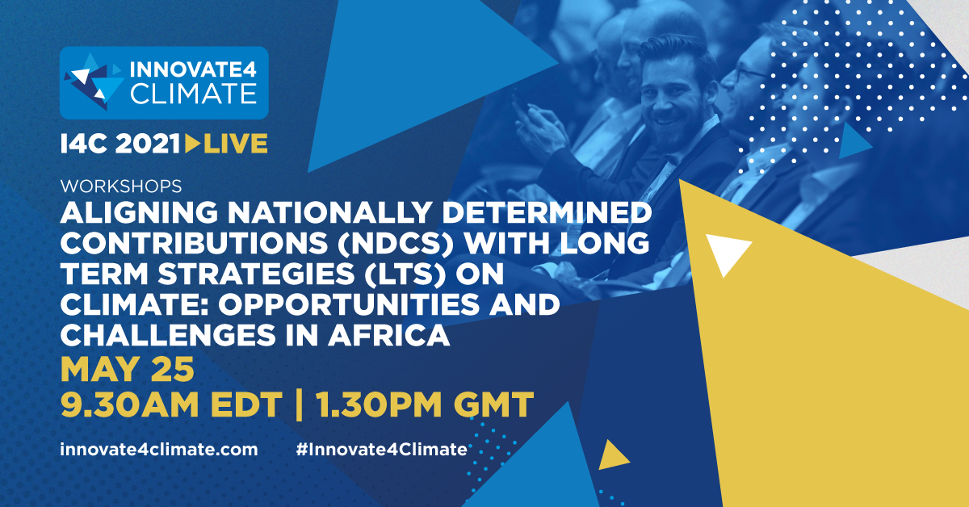
- This event has passed.
Aligning Nationally Determined Contributions with Long Term Low-Emission Development Strategies on Climate. Opportunities and Challenges in Africa.
Mai 25, 2021 @ 15:30 - 16:30

Workshop for Climate Innovation Series
https://www.innovate4climate.com/
(Registration link to I4C, Zoom login for wokshop tbc)
25 May 2021, 9.30AM EDT / 1.30PM GMT / 3.30PM CET / 4.30PM EAT
The goal of the Paris Agreement is to keep the global temperature increase to well below 2°C and pursue efforts to limit the increase to 1.5°C. Parties to the Agreement have been invited to communicate their long-term low greenhouse gas emission development strategies (LT-LEDS) considering the common but differentiated responsibilities and respective capabilities, in light of different national circumstances. Similarly, Parties are invited to update their Nationally Determined Contributions (NDC) reflecting their increased ambition until 2030.
The two policy processes are important for understanding and prioritizing which short- and medium-term investments and measures can contribute to a country’s climate goals while enabling countries to reach their long-term goals. LT-LEDS introduce a long-term perspective to policy planning that allows to consider whether certain activities may create long term lock-in effects into fossil fuel infrastructure even if they promise short term emission reductions compared to the status quo. This has implications on how to allocate resources, including international climate finance, capacity building and technology transfer.
LT-LEDS define a long-term vision for achieving the complete decarbonization of entire economies and can serve as goalposts for policymakers, investors, academia, and civil society. On the other hand, while NDCs are often affected by the constraints of ongoing policy processes, they offer practical and tangible roadmaps for realizing the Paris Agreement goals within the short to medium term. Considering long-term strategy in short term policymaking facilitates a shared understanding and higher certainty for stakeholders, enabling them to make more farsighted decisions and take early action. It can also foster innovation by sending the right signals to the private sector and researchers, which in turn can facilitate more ambitious NDCs over time. A long-term planning process enables to consider evolving adaptation needs and mitigation opportunities, hence, strengthen institutional capacity and regulatory frameworks over time.
It is therefore important that the two processes are aligned. This requires managing them in a mutually reinforcing manner, excluding negative implications for either of them. But how do countries realize this? Different countries in Africa are in the process of developing their long-term low emission development strategies and Nationally Determined Contributions. In order to demonstrate the practicability and benefits of aligning the two processes of long-term planning and setting NDCs, the GIZ Global Carbon Markets (GCM) Programme in Uganda in collaboration with the Climate Change Department of the Ministry of Water and Environment with support from the Germany Federal Ministry of Environment, Nature Conservation and Nuclear Safety will conduct a workshop dur nder the Clean Development Mechanism the African continent benefited the least in terms of issuance. This however did not mean that carbon market activities did not take place. The Eastern African region has a porfolio of projects and the countries are concerned as to the fate of CDM projects and programme of activities as we transition into Article 6 of the Paris Agreement.
Moderator
STEPHAN HOCH
Perspectives Climate Group
